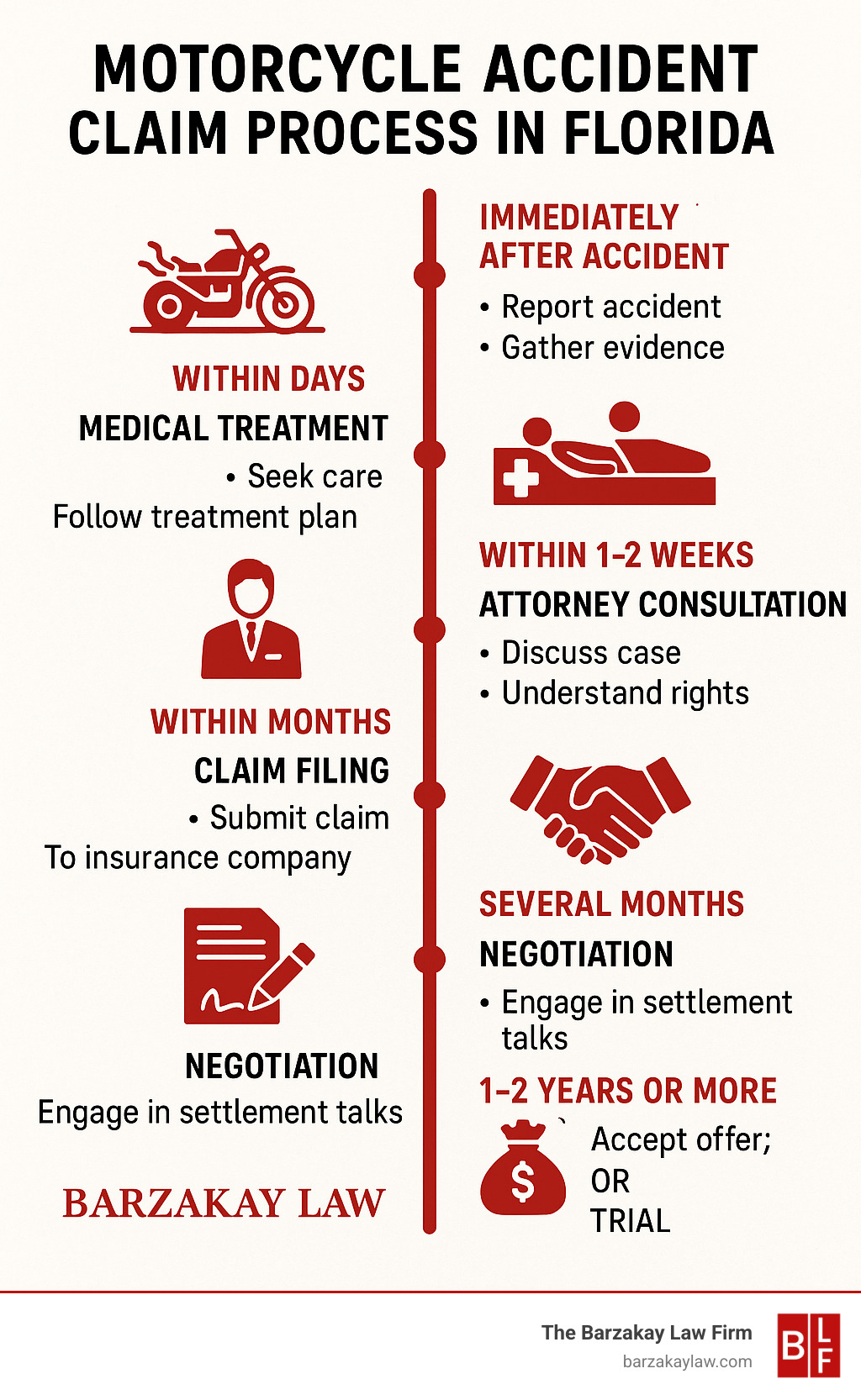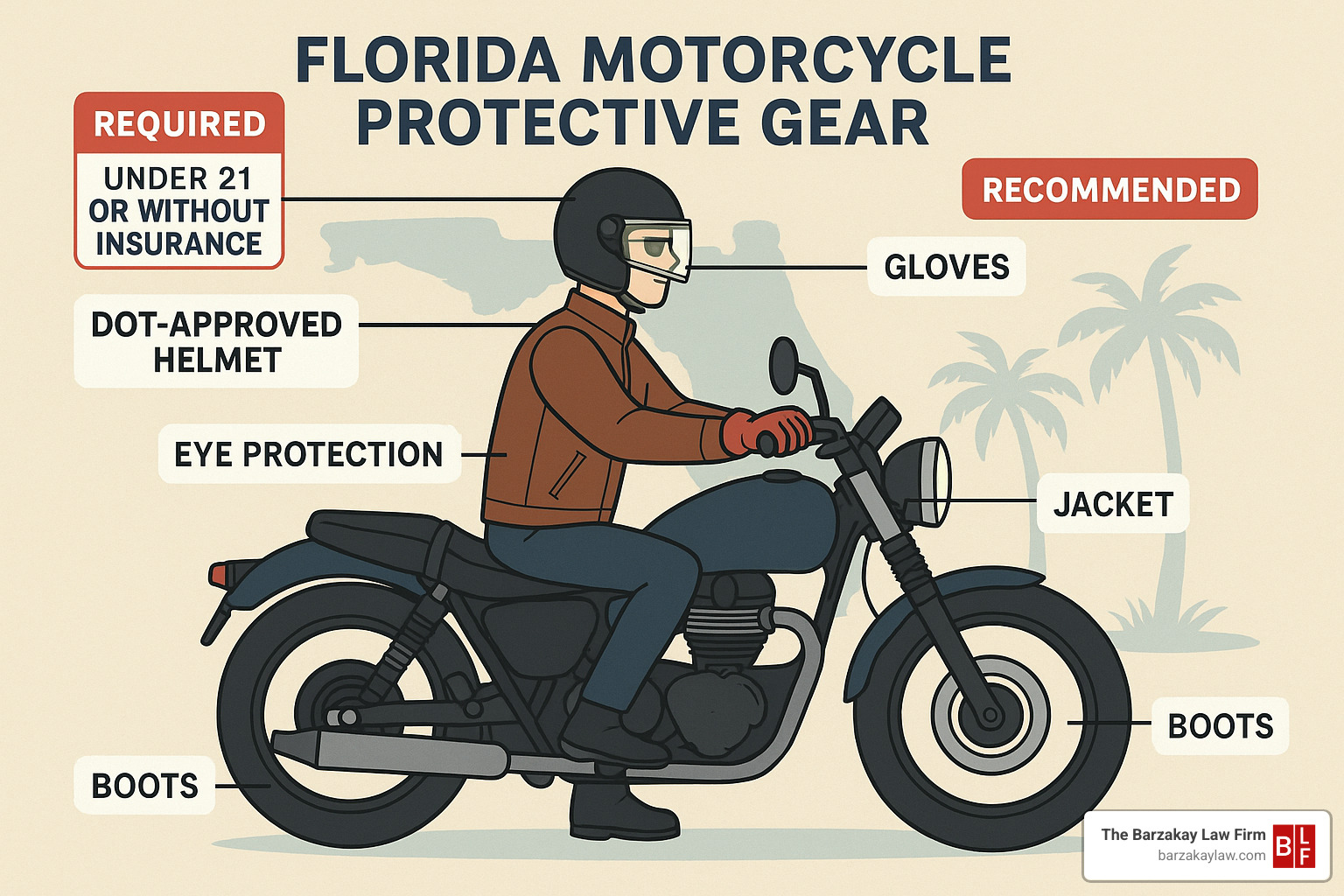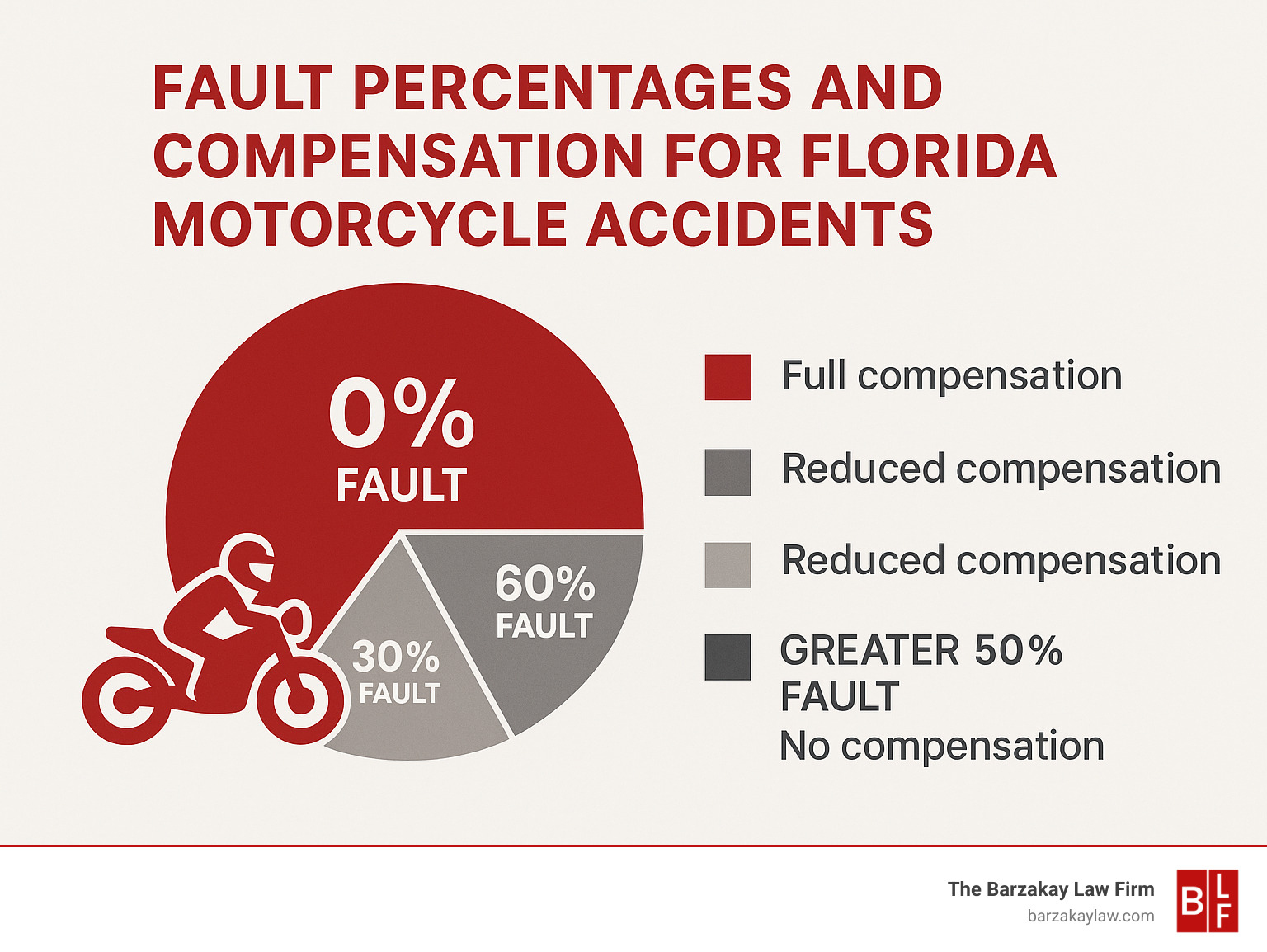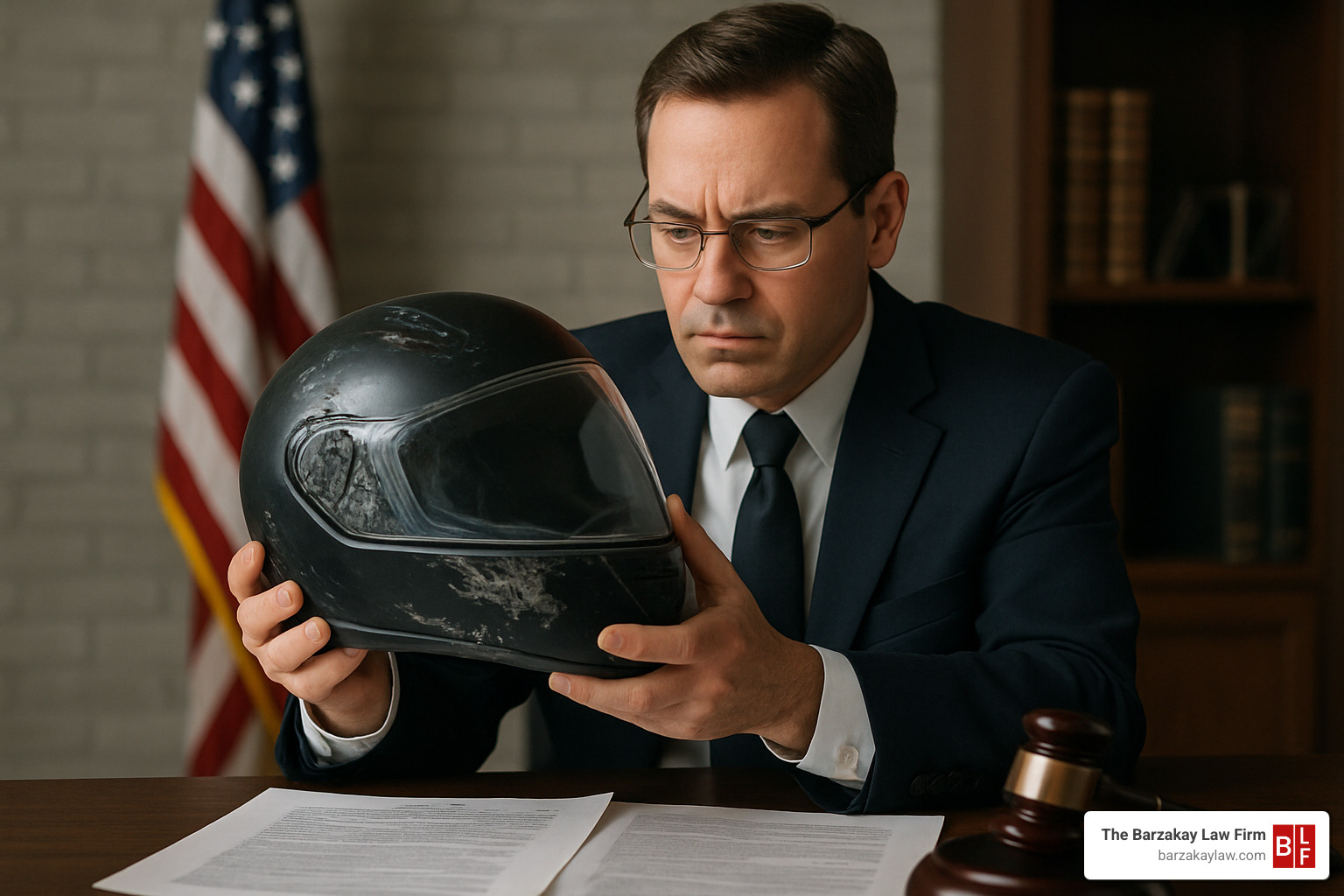Why Florida Motorcyclists Need Specialized Legal Representation
If you’re searching for a motorcycle accident attorney Florida, here’s what you need to know:
- Free Consultation: Most motorcycle accident attorneys offer free case evaluations
- No Fee Unless You Win: Attorneys typically work on contingency (only paid if you recover compensation)
- Specialized Knowledge: Look for attorneys with specific motorcycle accident experience
- Quick Action Required: Florida has a 2-year statute of limitations for filing claims
- Compensation Available: Medical bills, lost wages, pain and suffering, property damage
Florida’s highways offer some of the most beautiful riding conditions in the country, but with over 637,450 registered motorcycles, the state also sees a disproportionate number of serious motorcycle accidents. As a motorcycle accident attorney Florida firm, we understand that riders face unique challenges both on the road and in the legal system.
In Martin County alone, 62 motorcycle accidents occurred in 2020, resulting in 54 injuries and 5 fatalities. Most of these accidents happen during routine trips—running errands, commuting to work, or meeting friends—not during high-speed recreational rides.
When a motorcycle crash occurs, the consequences are often devastating. Unlike car occupants, riders lack the protection of airbags, seatbelts, and a metal frame. This vulnerability leads to more severe injuries, higher medical bills, and longer recovery times.
Insurance companies often exploit this vulnerability by offering quick, low settlements or unfairly blaming riders. Many adjusters hold biased views of motorcyclists as reckless, using these stereotypes to minimize or deny legitimate claims.
Florida’s motorcycle laws also differ significantly from those governing other vehicles. For example, motorcycles are exempt from Florida’s no-fault insurance system, meaning riders must steer a different set of rules when seeking compensation.
Whether you’ve suffered injuries or lost a loved one in a motorcycle accident, understanding your legal rights is crucial to receiving fair compensation. This guide will walk you through the essential steps to protect your rights and maximize your recovery after a Florida motorcycle accident.
Motorcycle accident attorney florida terms simplified:
– Miami bike crash attorney
– miami personal injury lawyer motorcycle accidents
– motorcycle personal injury lawyers
What to Do Immediately After a Motorcycle Crash in Florida
Those first moments after a motorcycle crash can feel like a blur. Your heart’s racing, adrenaline’s pumping, and you might not even feel your injuries yet. But what you do in these critical moments can make all the difference—both for your health and any compensation you might need down the road.
Call 911 right away. Even if you think you’re just a little banged up, motorcycle injuries can be tricky. That “just a bruise” feeling might actually be something more serious, especially with head injuries that don’t show symptoms immediately.
Let the medical professionals check you out. I know—many riders want to tough it out. But internal injuries don’t care how brave you are, and getting proper medical documentation starts your paper trail for any claim you might need to file.
Make sure the police file a report. This official document becomes your first piece of evidence. Be factual when giving your statement, but don’t speculate about fault or apologize (which insurance companies can twist into an admission of guilt).
Snap photos if you’re able. The accident scene will be cleaned up quickly, so capturing images of vehicle positions, road conditions, traffic signals, and weather can be invaluable later. Your smartphone is your best friend here.
Talk to witnesses. Bystanders who saw what happened can provide crucial, unbiased accounts. Get their names and contact information before they disappear into the Florida sunshine.
Don’t rush to repair your bike or toss damaged gear. Your motorcycle, helmet, and riding gear might contain evidence that helps prove what happened. Store everything as-is until your case resolves.
Notify your insurance company promptly—but stick to the basics. Just report that an accident occurred. Save the details for after you’ve spoken with a motorcycle accident attorney Florida.
First 60 Minutes Checklist
That first hour is crucial. Here’s your survival guide:
Your health comes first—accept emergency medical treatment. While the paramedics work, have someone photograph your visible injuries before they’re treated or bandaged. These photos can powerfully document your initial condition.
Exchange information with the other driver, getting their name, contact details, license number, and insurance information. But be careful about discussions—this isn’t the time to debate who was at fault or make statements that might come back to haunt you.
Arrange for your motorcycle to be safely towed and stored. Don’t just leave it to chance—a properly documented chain of custody for your bike preserves it as evidence.
Finally, call a trusted friend or family member. Having someone with a clear head by your side can be invaluable when you’re dealing with the chaos and possibly pain of a crash scene.
Critical Evidence to Collect
Evidence disappears quickly after a crash. Here’s what you need to capture before it’s gone:
Your helmet’s condition tells a story about impact forces—document any scratches, cracks, or dents thoroughly. Check if your motorcycle or nearby vehicles have dashcam footage that might have captured the accident.
Skid marks and debris patterns might look like road mess to you, but to accident reconstruction specialists, they’re like reading a book about what happened. Take wide-angle shots that show their full length and direction.
Note weather and road conditions. Was it raining? Was the sun in drivers’ eyes? Was there construction or a pothole that contributed? These details matter.
Use your smartphone to take multiple photos from different angles. Capture the entire scene, including traffic signals, signs, and lane markings. And don’t forget to document vehicle damage—especially the points where vehicles made contact.
The more evidence you gather now, the stronger position you’ll be in later when dealing with insurance companies or pursuing a claim with help from a motorcycle accident attorney Florida who understands the unique challenges riders face.
Florida Motorcycle Laws, Insurance & Deadlines You Must Know
Riding in the Sunshine State comes with its own set of rules that every biker should understand. Florida’s motorcycle laws are quite different from those governing cars and trucks – and knowing these differences could save you significant headaches (and money) down the road.
Florida Motorcycle Helmet Law might surprise you. If you’re over 21, you can legally ride without a helmet – but only if you carry at least $10,000 in medical insurance coverage. While this freedom is appreciated by many riders, going helmet-free could affect your compensation if you’re injured in a crash.
Florida’s Move Over Act got an important update in 2024. As of January 1st, motorists must change lanes or slow to 20 MPH when passing hazard vehicles – and yes, this applies to motorcycles too. This law helps protect vulnerable riders when they’re stopped on the roadside.
Unlike California, lane splitting (squeezing between lanes of traffic) remains illegal in Florida. Tempting as it might be in Miami traffic, engaging in this practice can seriously harm your case if you’re involved in an accident, as it may be considered contributory negligence.
Here’s a key difference many riders don’t realize: motorcycles are exempt from Florida’s no-fault insurance system. This means you can’t access Personal Injury Protection (PIP) benefits, but there’s an upside – you can pursue compensation from at-fault drivers without meeting the “serious injury threshold” that car drivers face.
While Florida doesn’t technically mandate motorcycle insurance, all riders must demonstrate financial responsibility in case of an accident. Having proper coverage isn’t just smart – it’s essential protection for your financial future.
Time is not on your side after a crash. Under Florida Statutes §95.11, you generally have just two years from your accident date to file a personal injury lawsuit. Miss this deadline, and you’ll likely lose your right to compensation – regardless of how strong your case might be.
Helmet & Gear Rules Explained
Your gear choices matter – both for safety and potential compensation after a crash.
If you do wear a helmet (which we strongly recommend), it must meet DOT Approval standards. Those novelty helmets might look cool, but they offer inadequate protection and won’t satisfy legal requirements if you’re under 21 or lack proper insurance coverage.
Speaking of age, riders under 21 must wear helmets regardless of insurance coverage – no exceptions. The law recognizes that younger riders benefit from this additional protection.
Your gear choices can affect your case too. Under Florida’s comparative negligence rules (§768.81), not wearing a helmet might reduce your compensation if the defense can prove your injuries would have been less severe with proper headgear. The good news? It doesn’t completely bar you from recovery.
Eye protection isn’t optional for anyone – all motorcyclists, regardless of age or helmet use, must wear eye protection that complies with Florida standards. Those flying bugs and road debris are no joke at highway speeds!
While Florida doesn’t mandate specific footwear or handlebar positioning, proper boots are strongly recommended. Your handlebars must be positioned so your hands rest at or below shoulder height when seated – a requirement designed for optimal control.
Insurance Basics for Riders
Florida’s motorcycle insurance requirements might seem relaxed, but don’t be fooled – proper coverage is essential.
While not legally required, we strongly recommend carrying liability insurance with at least $25,000 per person/$50,000 per accident for bodily injury and $10,000 for property damage. A serious accident without this coverage could financially devastate you.
Perhaps the most important coverage you can buy is UM/UIM Coverage (Uninsured/Underinsured Motorist). With approximately 20% of Florida drivers rolling without insurance, this coverage protects you when you’re hit by someone who can’t pay for your damages. It’s relatively inexpensive peace of mind.
If you choose to ride without insurance, be prepared to demonstrate proof of financial responsibility after an accident. This might require posting a bond or providing evidence of significant assets – requirements that are impractical for most riders.
Don’t forget about filing deadlines with your insurance company. Report accidents promptly, typically within 24-72 hours. Waiting too long can give insurers grounds to deny your claim, leaving you without the protection you paid for.
For detailed research on routine trip crashes affecting motorcyclists, check out this Scientific research on routine trip crashes. And to understand how Florida’s comparative fault rules might affect your claim, visit our detailed explanation of comparative fault in Florida.
Proving Fault, Evidence & Comparative Negligence
When you’re picking up the pieces after a motorcycle crash, figuring out who’s at fault becomes the foundation of your entire claim. Florida’s legal system takes a nuanced approach to assigning responsibility—and understanding this process can make all the difference in your recovery.
Think of fault like a puzzle that needs solving. The pieces come from multiple sources:
Accident Reconstruction brings science into the equation. These professionals analyze skid marks, vehicle damage, and road conditions to create a physics-based explanation of how your crash unfolded.
Police Narrative often provides the first official assessment. The responding officer’s observations and conclusions carry significant weight, even though they’re not the final word on fault.
Eyewitness Testimony adds the human perspective. Someone who watched your accident happen might have noticed the driver texting or running a red light—details that could transform your case.
Surveillance Video doesn’t lie. Footage captured by nearby businesses, traffic cameras, or doorbell cameras can provide indisputable evidence of exactly what happened in those crucial seconds.
Black-Box Data reveals what was happening inside the other vehicle. Many modern cars record speed, braking patterns, and steering inputs right before a crash—information that can clearly establish negligence.
How Fault Is Assigned Under §768.81
Florida’s comparative negligence system works like a percentage game. Everyone involved might share some responsibility, and here’s how it breaks down:
Driver Negligence covers a wide range of careless behaviors. The texting driver who didn’t see you, the commuter who made an illegal turn, or the person who decided to drive after having “just a couple” drinks—all these actions constitute negligence that can be proven and quantified.
Rider Conduct matters too. If you were speeding or perhaps your taillight was out, these factors might assign you a portion of fault. Being honest about your own role doesn’t mean giving up your claim—it just affects the final calculation.
Mechanical Defects sometimes play a surprising role. A defective motorcycle part or poorly maintained vehicle might shift some responsibility to manufacturers or maintenance providers.
Road Conditions can be culprits as well. That massive pothole or missing guardrail? The government entity responsible for road maintenance might bear some liability.
Under Florida’s pure comparative negligence system, your compensation adjusts according to your share of fault. If you’re awarded $100,000 but found 20% responsible, you’ll receive $80,000. This system allows for recovery even if you bear significant responsibility—a fact that surprises many riders.
You can learn more about how this works in practice through our detailed explanation of comparative fault in Florida car crash cases.
Strengthening Your Claim File
Building a bulletproof claim requires methodical documentation and the right supporting voices:
Expert Testimony brings authority to your case. A medical professional explaining why your injury will require lifelong care carries more weight than the same information coming from you alone. Similarly, an accident reconstruction specialist can translate complex physics into understandable evidence of the other driver’s negligence.
Medical Records tell your body’s story. Every X-ray, treatment note, and therapy session creates a paper trail that documents exactly what you’ve endured. These records connect the accident directly to your injuries and establish their severity.
Property Damage Appraisals quantify your material losses. Beyond your motorcycle’s value, consider your helmet, riding gear, phone, watch, and anything else damaged in the crash. These items add up quickly and deserve full compensation.
Victim Journal captures what medical records can’t. Your daily notes about pain levels, activities you can no longer enjoy, and emotional struggles provide powerful evidence of your suffering. Start this journal as soon as possible after your accident—consistency matters.
Employment Records document financial impact. Pay stubs, benefits information, and statements from your employer help calculate exactly what income you’ve lost while recovering—and what future earnings might be affected.
A motorcycle accident attorney Florida knows exactly which pieces of evidence will build the strongest case for your specific situation. They’ll help you gather, preserve, and present this evidence in the most compelling way possible.
Compensation After a Florida Motorcycle Wreck
When the rubber meets the road (or sadly, when you meet the road), motorcycle accidents often lead to injuries that are more severe than typical car crashes. The road to recovery isn’t just physically demanding—it can be financially devastating too.
After a motorcycle accident in Florida, you deserve compensation that truly reflects all your losses. Let’s break down what you might be entitled to:
Your medical expenses form the foundation of most claims. This includes everything from the ambulance ride and emergency room visit to surgeries, hospital stays, medications, and ongoing physical therapy. Don’t forget future medical needs too—many injuries require long-term care that should be factored into your settlement.
Rehabilitation costs often extend beyond standard medical care. You might need specialized treatments, adaptive equipment for your home, or even modifications to make your living space accessible if you’ve suffered a serious injury.
Lost income matters enormously. Whether you missed two weeks or two years of work, those lost paychecks, bonuses, commissions, and self-employment earnings should be replaced. If your injuries prevent you from returning to your previous job or limit your earning potential, you deserve compensation for those future losses too.
The physical pain and emotional suffering you’ve endured also deserve recognition. These non-economic damages acknowledge the sleepless nights, the activities you can no longer enjoy, and the overall impact on your quality of life.
Your damaged property—from your beloved motorcycle to your protective gear and personal items—should be repaired or replaced. Good riding gear isn’t cheap, and neither is a quality bike.
In cases involving particularly reckless behavior, such as drunk driving, punitive damages might be awarded. These additional funds are meant to punish truly dangerous conduct and deter others from similar behavior.
And tragically, if you’ve lost a loved one in a motorcycle accident, wrongful death compensation can help with funeral expenses, lost financial support, and the immeasurable loss of companionship.
| Economic Damages | Non-Economic Damages |
|---|---|
| Medical bills | Pain and suffering |
| Lost wages | Emotional distress |
| Property damage | Loss of enjoyment of life |
| Rehabilitation costs | Mental anguish |
| Future medical expenses | Disfigurement |
| Lost earning capacity | Loss of consortium |
| Out-of-pocket expenses | Inconvenience |
Typical Injury Profiles & Values
Motorcycle accidents tend to cause specific types of injuries, each with different compensation considerations:
Traumatic Brain Injury (TBI) can occur even with proper helmet use. From mild concussions to severe brain damage, these injuries often require extensive treatment and sometimes lifetime care. Compensation typically ranges from $100,000 for milder cases to several million dollars for severe injuries requiring lifelong assistance.
Spinal cord injuries represent some of the most life-altering outcomes. Partial or complete paralysis fundamentally changes everything about a person’s daily existence. These catastrophic injuries usually result in multi-million dollar settlements because of enormous lifetime care needs and the profound impact on quality of life.
Fractures are almost a given in motorcycle accidents. From simple breaks to compound fractures requiring surgical repair with pins and plates, bone injuries can lead to permanent mobility issues. Compensation typically ranges from $50,000 to $250,000 depending on severity and recovery outlook.
Road rash sounds minor but can be incredibly serious. When skin meets pavement at speed, the resulting abrasions can lead to infections, permanent scarring, and even nerve damage. Serious cases may warrant $25,000 to $100,000 in compensation, especially when visible scarring affects the face or other prominent areas.
Internal injuries from blunt force trauma often require emergency surgery and extended recovery periods. Damage to organs like the spleen, liver, or kidneys can have lasting health implications. These cases typically settle for $75,000 to $500,000 depending on the long-term effects.
For catastrophic injuries, economic experts calculate lifetime cost projections that account for decades of care needs, lost earnings, and necessary accommodations. These projections often reach into the millions for severe cases, especially for younger victims with longer life expectancies.
Statute of Limitations & Out-of-State Riders
Time waits for no one—especially in legal matters. Under Florida Statutes §95.11, you generally have just two years from the date of your accident to file a personal injury lawsuit. Miss this deadline, and you’ll likely lose your right to compensation permanently.
In limited circumstances, this clock can be paused (legally known as “tolling”). For example, if the victim is a minor or if the defendant leaves the state, the countdown might temporarily stop.
If you’re an out-of-state rider who crashed while enjoying Florida’s scenic roads, you’re still subject to Florida’s laws and deadlines, regardless of your home state’s rules. The accident location typically determines which state’s laws apply.
For accidents involving parties from different states, you might have options about where to file your lawsuit. A knowledgeable motorcycle accident attorney Florida can help determine the most advantageous jurisdiction for your specific situation.
The path to fair compensation isn’t always straightforward, but understanding these fundamentals puts you in a stronger position to recover what you truly deserve. For more information about how pain and suffering is calculated, check out our detailed guide on compensation for pain & suffering.
When and How to Work With a Motorcycle Accident Attorney Florida
Finding the right motorcycle accident attorney Florida after a crash can make all the difference in your recovery journey. Think of your attorney as your personal advocate during what might be one of the most challenging times of your life.
Most motorcycle accident attorneys work on a contingency basis – meaning you don’t pay unless they win your case. This arrangement removes the financial barrier to quality legal representation when you need it most. Typical fees range from 33% to 40% of your settlement, depending on case complexity and whether it goes to trial.
Take advantage of free initial consultations to find the right fit. Come prepared with questions about their experience handling motorcycle cases specifically. Pay attention to how well they listen and whether they explain complex legal concepts in ways you can understand.
Clear communication is crucial for a successful attorney-client relationship. During your first meeting, establish expectations about how often you’ll receive case updates and who will be your primary contact person. The best attorneys make themselves available for questions while respecting your recovery time.
While most motorcycle accident cases settle out of court, choose an attorney who’s genuinely prepared to take your case to trial if necessary. Insurance companies often track which attorneys regularly go to court versus those who always settle – and they offer better settlements when they know your lawyer isn’t afraid of the courtroom.
Benefits of Hiring a Motorcycle Accident Attorney Florida
Working with a motorcycle accident attorney Florida provides numerous advantages that extend far beyond just legal representation.
Attorneys with motorcycle accident experience understand the true value of your injuries, including future medical needs and long-term impacts. This helps prevent you from accepting a settlement that might seem generous now but won’t cover your needs down the road.
Insurance companies have teams of adjusters and lawyers whose job is to minimize payouts. Your attorney levels the playing field, countering lowball offers and delay tactics with evidence-backed demands for fair compensation.
The legal process involves complex paperwork and strict deadlines that can overwhelm anyone, especially someone recovering from injuries. Your attorney ensures all documents are properly prepared and filed on time, preventing technical issues from derailing your case.
Beyond paperwork, attorneys can issue preservation letters to prevent destruction of evidence and work with investigators to gather crucial proof that might otherwise disappear. They can also coordinate with your healthcare providers to ensure proper documentation of injuries and may negotiate medical liens to maximize your recovery.
Perhaps most importantly, having professional representation allows you to focus on healing while your attorney handles the legal complexities. The peace of mind that comes from knowing a dedicated professional is protecting your interests is invaluable during recovery.
Cost & Contingency Fees with a Motorcycle Accident Attorney Florida
Understanding the financial aspects of legal representation helps prevent surprises down the road.
Standard contingency fees for motorcycle accident cases typically range from 33% to 40% of your recovery amount. This percentage may increase if your case proceeds to trial due to the additional work and resources required. This structure aligns your attorney’s interests with yours – the better you do, the better they do.
Beyond the contingency fee, cases involve costs such as filing fees, expert witness fees, deposition expenses, and investigation costs. These are typically advanced by the law firm and reimbursed from your settlement. A good attorney will explain these potential expenses upfront.
Make sure you understand exactly what “no win, no fee” means in your agreement. While you won’t pay attorney fees if you don’t recover compensation, some firms may still hold you responsible for certain costs. At The Barzakay Law Firm, we’re transparent about our fee structure from day one.
Your fee arrangement should be clearly documented in a written contract that specifies the exact percentage, how costs are handled, and when payment is due. Never hesitate to ask questions about anything in the agreement that isn’t crystal clear.
At The Barzakay Law Firm, we believe in building relationships based on trust and transparency. We ensure our clients fully understand the financial aspects of their case before proceeding, allowing them to make confident decisions about their legal representation.
Frequently Asked Questions about Florida Motorcycle Accident Claims
What if I wasn’t wearing a helmet—can I still recover?
Yes, you absolutely can pursue compensation even without a helmet. Florida gives riders over 21 the freedom to ride helmet-free, provided you carry at least $10,000 in medical insurance.
That said, going helmet-free might affect your compensation. Under Florida’s comparative negligence system, the defense may argue your injuries would have been less severe with proper headgear. If successful, your compensation could be reduced by your percentage of fault—but only for injuries a helmet would have prevented, like head trauma.
The burden falls on the defense to prove a helmet would have made a difference in your specific case. They’ll need to connect the dots between your choice and your injuries, considering factors like impact points and injury types. A motorcycle accident attorney Florida can help ensure this argument isn’t unfairly applied to injuries unrelated to head protection.
How long does a motorcycle accident case usually take to resolve?
“How long will my case take?” is probably one of the first questions on your mind—and unfortunately, there’s no one-size-fits-all answer.
Most straightforward motorcycle accident cases in Florida wrap up within 6-18 months, but several factors can extend this timeline:
When you settle outside of court, you might see resolution in 6-12 months. If your case goes to trial, expect 1-3 years or even longer. Severe injuries, especially those requiring ongoing treatment, naturally take more time because we need to understand your long-term prognosis before valuing your claim properly.
Cases with disputed liability need extra time for investigation and expert analysis. And let’s be honest—some insurance companies play the delay game while others are more reasonable.
At The Barzakay Law Firm, we work efficiently but never rush at the expense of your compensation. We’d rather take the time to build a rock-solid case than leave money on the table with a hasty settlement.
Will my compensation be reduced if I’m partly at fault?
Yes, but Florida’s pure comparative negligence system still allows you to recover damages even if you share responsibility for the accident. Your compensation simply gets reduced by your percentage of fault.
Here’s how it works in real terms: If your damages total $100,000 and you’re found 30% responsible, you’ll receive $70,000. Even if you’re found 90% at fault (which is quite high), you could still recover $10,000.
Motorcyclists are often assigned partial fault for things like:
– Lane splitting (illegal in Florida)
– Speeding
– Forgetting to signal
– Riding with inadequate lighting
– Poor lane positioning
Unfortunately, many insurance adjusters harbor biases against motorcyclists and try to shift more blame onto riders. This is where having a dedicated motorcycle accident attorney Florida becomes invaluable—they’ll fight to ensure fault is fairly allocated based on evidence, not stereotypes about bikers.
The Barzakay Law Firm understands these dynamics and works tirelessly to protect riders from unfair blame, maximizing your compensation even when comparative negligence comes into play.
Conclusion
Motorcycle accidents in Florida can have devastating consequences, leaving victims with serious injuries, mounting medical bills, and significant life disruptions. Understanding your rights and the unique aspects of motorcycle accident claims is essential to securing the compensation you deserve.
As we’ve outlined in this guide, taking prompt action after a crash is crucial—from seeking immediate medical attention to preserving evidence and contacting a motorcycle accident attorney Florida. The two-year statute of limitations means you must act relatively quickly to protect your legal rights.
Florida’s comparative negligence system, helmet laws, and insurance requirements create a complex legal landscape for motorcycle accident victims. Working with an attorney who understands these nuances can make the difference between a denied claim and substantial compensation.
At The Barzakay Law Firm, we’re committed to helping motorcycle accident victims throughout Florida, with offices in Hollywood, Miami, Boca Raton, Sunrise, Orlando, and Fort Lauderdale. We understand the challenges riders face both on the road and in the legal system, and we fight tirelessly to overcome bias and secure fair treatment for our clients.
Most motorcycle accidents occur during routine trips, not high-speed recreational rides. No matter the circumstances of your accident, you deserve compassionate representation from attorneys who will treat your case with the attention and dedication it deserves.
If you or a loved one has been injured in a motorcycle accident, we invite you to contact us for a free consultation. We work on a contingency fee basis, meaning you pay nothing unless we recover compensation for you. Let us help you ride towards justice and the financial recovery you need to move forward.
Learn more about our motorcycle accident services in Hollywood





